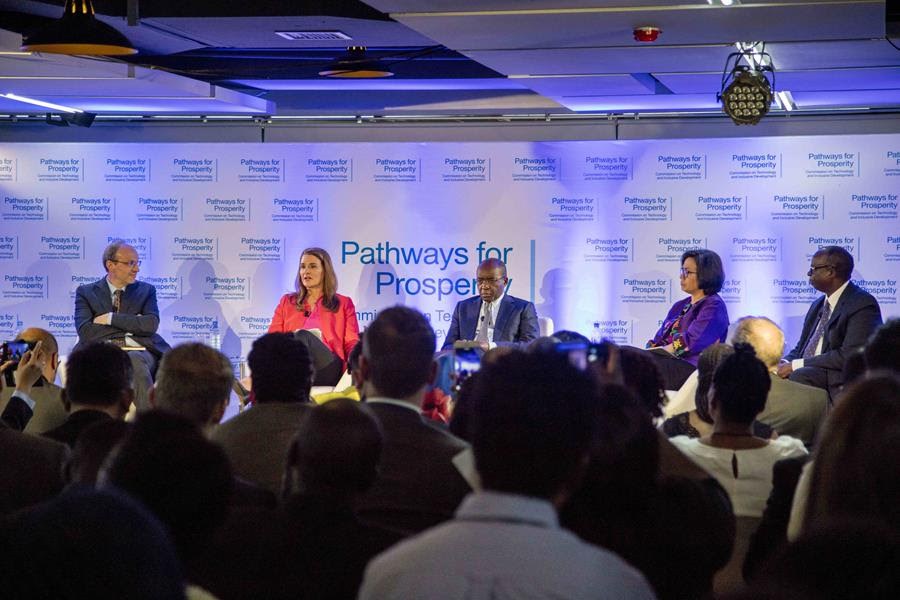advertisement
New initiative launched to explore impact of emerging technologies on developing countries
Oxford University’s Blavatnik School of Government and the Bill & Melinda Gates Foundation have launched “Pathways for Prosperity” to explore…

Oxford University’s Blavatnik School of Government and the Bill & Melinda Gates Foundation have launched “Pathways for Prosperity” to explore the impact of rapid technological change on developing countries
Dubbed as, Pathways for Prosperity: Commission on Technology and Inclusive Development the launch was attended by Melinda Gates, co-chair of the Bill & Melinda Gates Foundation; Minister Sri Mulyani Indrawati, minister of finance of Indonesia; and Strive Masiyiwa, founder and executive chairman of Econet and took place at the Nairobi innovation space iHub.
“Innovation can help people transform their lives, but only if they have access to it,” said Melinda Gates. “This commission brings together diverse thinkers and doers committed to ensuring that everyone, no matter how rich or poor, can take advantage of technological innovation.”
advertisement
The event coincided with the World Economic Forum in Davos, Switzerland, where global leaders gathered to discuss the importance of creating a “shared future in a fractured world. ”The commission emphasized the need for the global conversation to include the role of technology in driving progress and inclusion in developing countries.
The Blavatnik School of Government at Oxford University, brings together a diverse range of leaders from government, business and academia to focus on the impact on developing countries of frontier technologies such as automation, artificial intelligence, 3D printing, energy generation and storage, and biotechnology.
The commission will provide evidence and analysis, along with concrete policy recommendations, to help developing country governments navigate this rapidly evolving landscape.
advertisement
“As an entrepreneur, technology underpins everything I do, and I am fascinated by what is coming down the line. But I know that there are also potential pitfalls and risks,” said Strive Masiyiwa. “This commission gives us a way of working together to understand how to harness technology for good, use it to enhance opportunities for all and drive inclusive growth.”
The Blavatnik School’s Stefan Dercon, former chief economist of the UK Department for International Development (DfID), and Benno Ndulu, former governor of the Central Bank of Tanzania, will lead the commission as its academic directors.
Other commissioners include Kamal Bhattacharya, CIO of Safaricom; Shanta Devarajan, senior director for development economics at the World Bank; Minister Sigrid Kaag, minister for foreign trade and development cooperation of the Netherlands; Nadiem Makarim, founder and CEO of Go-Jek; Maria Ramos, CEO of Barclays Africa Group; Daniela Rus, director of the Computer Science and Artificial Intelligence Laboratory at MIT; and Shivani Siroya, founder and CEO of Tala.
advertisement
While some technological advancements may disrupt or block traditional routes out of poverty by making certain jobs obsolete, some new technologies could offer an alternative roadmap to inclusive development. For instance, the widespread use of digital financial services in Kenya has enabled 75 percent of the people over 15 years old to have access to bank accounts (up from 10 percent in 2005), and mobile financial services such as M-Pesa have lifted 2 percent of the population out of poverty.
“We live in exciting times. The pace and scale of technological change offer big challenges and significant opportunities for developing countries,” said Sri Mulyani Indrawati.
“Technology can strengthen the relationship between citizens and governments, fuelled by transparency and access to information. New tools could transform the way we deliver public services and promote inclusive growth. To chart the right path, policymakers need to be equipped with evidence-based analysis on the merits and demerits of these technologies.”
On the other end Stefan Dercon said, “The world has made incredible progress over the past 25 years, with the number of people living in extreme poverty being halved to about 800 million. Whether this positive trend continues depends in large part on how we respond to the new forces shaping our world, specifically rapid technological change.”